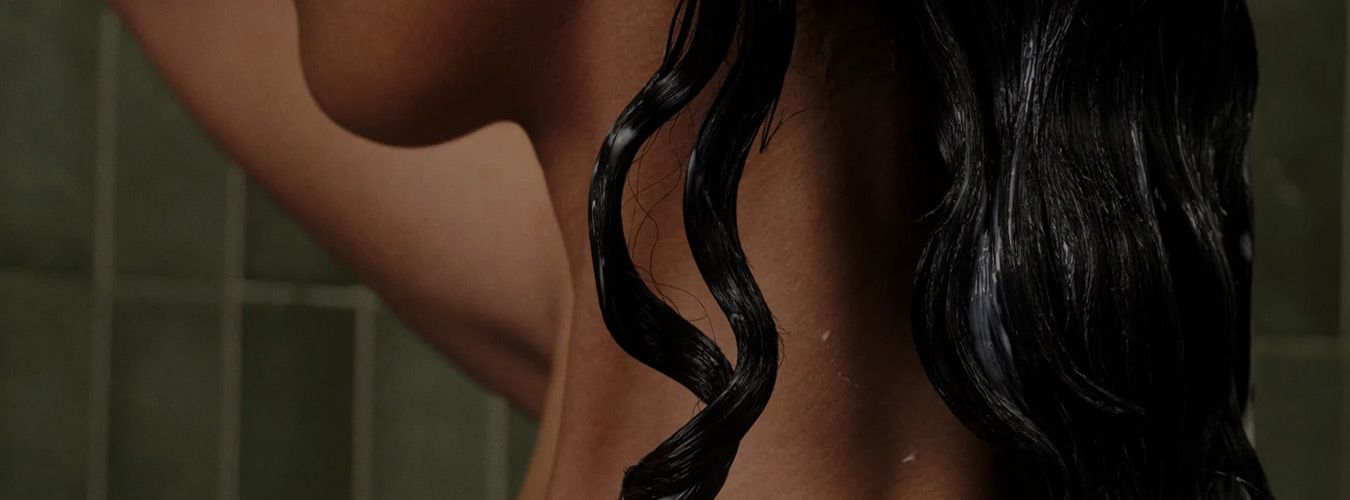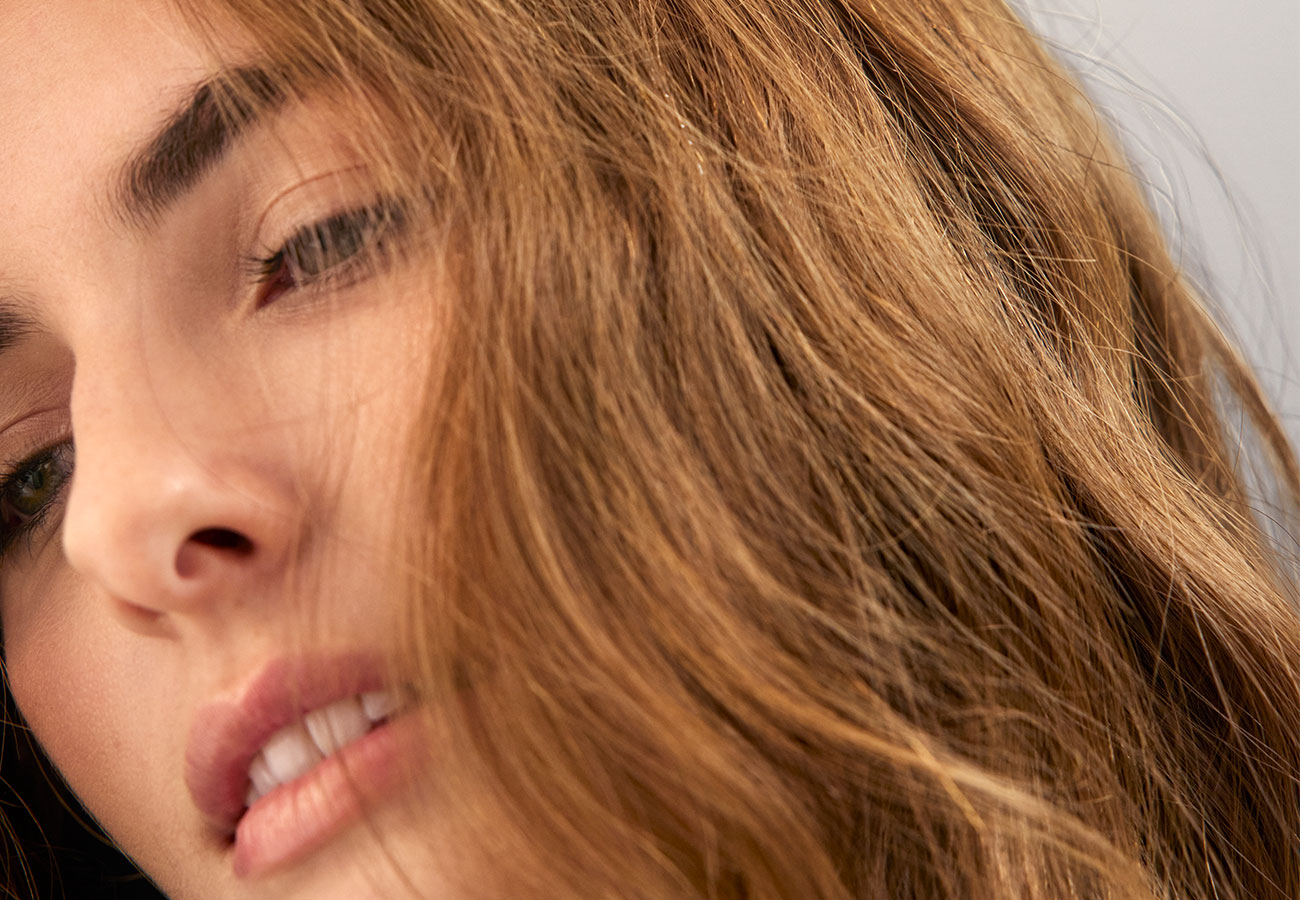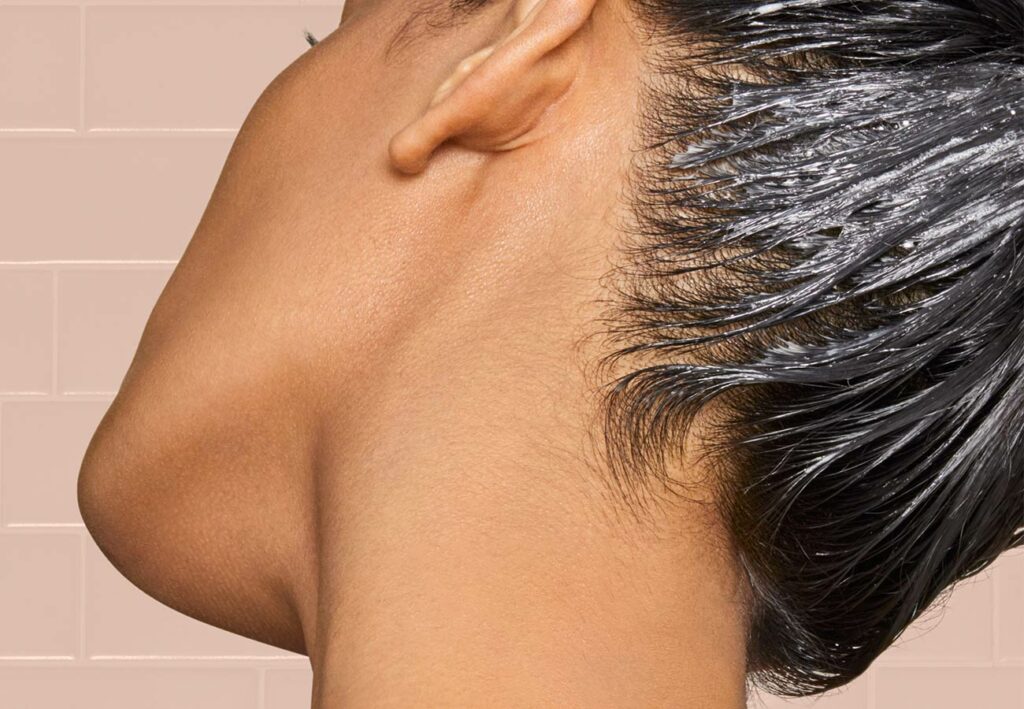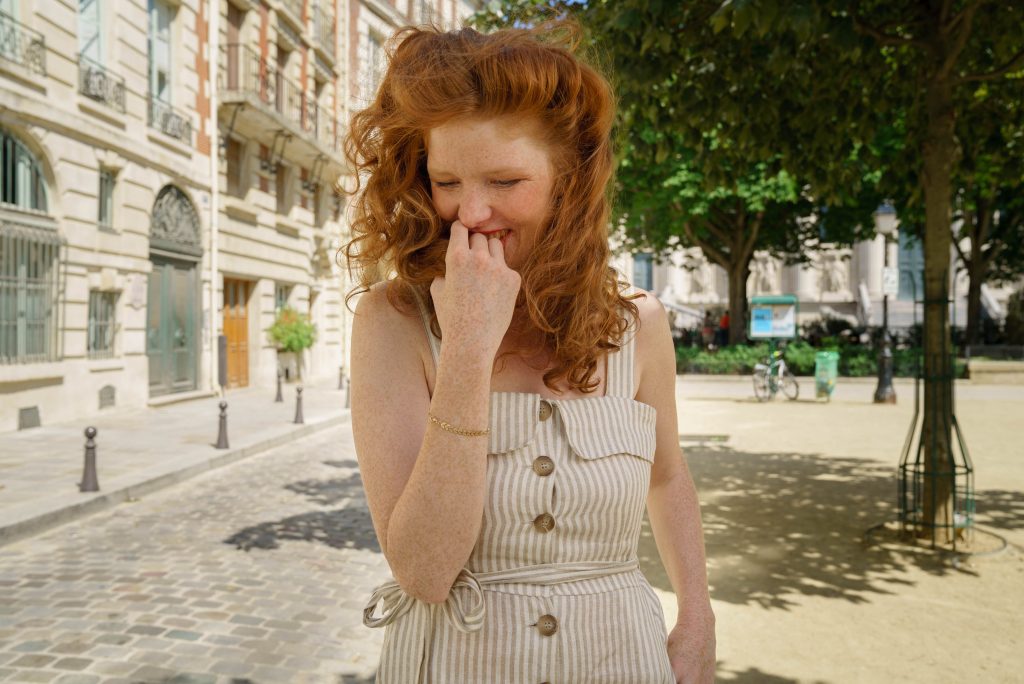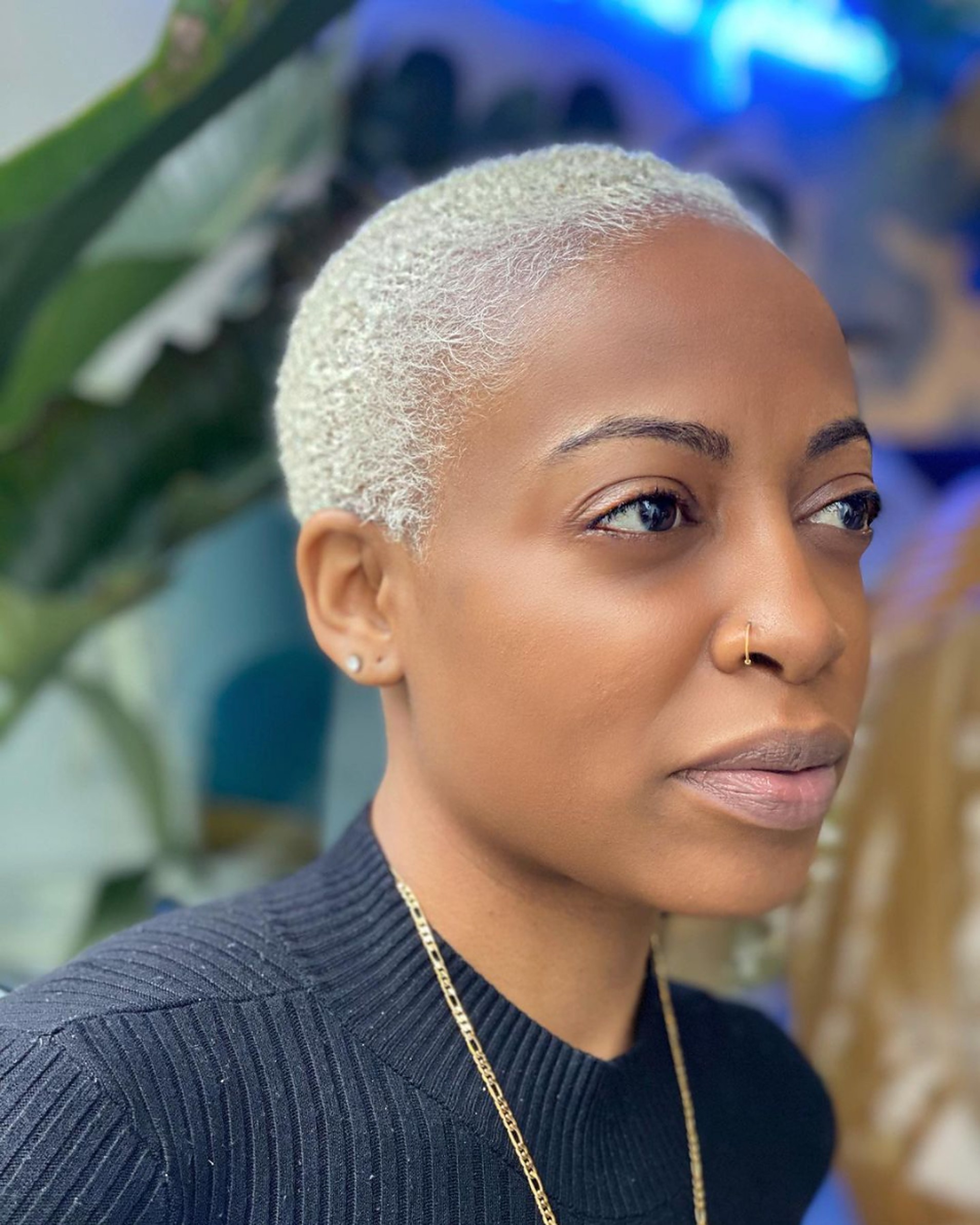What is frizzy hair?
Simply put, frizzy hair is the sensation that your hair has a mind of its own. It feels dry and poofy, and might fray outward in all kinds of directions, instead of laying flat and smooth.
It’s important to know what is happening on a microscopic level, though, because that’s the key to getting ahead of frizz in the first place. Here is how Bachowski explains it: “There are four types of bonding interactions that occur in hair proteins. One of them (and the most important to this topic) is hydrogen bonds. Hydrogen bonds are typically weak, which means that they can change or break easily. When you style your hair with heat and then you walk outside on a humid summer day and your hair loses shape and frizzes up, that’s due to the hydrogen bonds in your hair breaking. Basically any introduction of water will break the bonds and force your hair to go back to its original shape.”
Hydrogen bonds are what’s responsible for any shape your hair takes—whether you’re straightening it, applying a styler, or if it’s pressed down onto your head by a hat. In all of these situations, the hydrogen bonds are at work. If you wet your hair and reset it, the bonds are broken but then reform as they dry. So, again, significant moisture (or even a lack thereof) in the air can compromise these bonds. If there’s a lack of moisture in the air, then the hydrogen in your hair will dissipate into the air to try and create a balance. (The result: Unwanted frizz!) If there is too much moisture in the air and it’s quite humid, then that moisture will break down the hydrogen bonds in your hair, almost as if you had wetted it and let it dry naturally.
How prone you are to frizz is usually determined by your hair’s porosity.
What is hair porosity? How do you test hair porosity?
The higher your porosity, the more porous your hair is, and the easier it lets moisture in and out, Bachowski says. It is these individuals who are more prone to frizzing. “Similarly, if your hair is not porous, then it will not absorb water quickly, but it will retain it.” In a perfect world, hair would absorb and retain moisture in a balanced way.
How do you know if your hair is porous, then? “One way to test porosity is to spray water on dry hair and watch how fast your hair absorbs the water and dries,” Bachowski explains. “The quicker it does, the higher the porosity.” It could be hard to determine this without some sort of control to measure against. But if you notice that your hair dries faster than your peers’ hair (of the same length/density), then you have a higher porosity than them. If your hair takes especially long to dry, then you have a lower porosity.
You can also take a clean, naturally fallen hair strand and submerge it in a clear glass of tap water. If it sinks, then it is highly porous, since it is taking in lots of water and succumbing as a result. If it floats, then it has low porosity. If it kinda hovers in between (and eventually sinks), then its porosity is some place in the middle.
How to know if your hair is healthy
Which hair types are most prone to frizz?
Porosity isn’t the only influencing trait behind frizzing. “Hair that is thicker or curlier tends to be more dry,” Bachowski notes. “And with that, the hair is more prone to absorbing moisture, which will cause frizz.”
Why is my hair so frizzy?
We already know that frizz happens on a microscopic level. But what everyday conditions and behaviors cause these broken hydrogen bonds—the ones that lead to unwanted frizzing?
The environment
Hot summer humidity and dry winter weather both cause unwanted frizz by disrupting the happy stasis of our styled hair. (Though it’s not all relative to the season. It could be a humid day, and if you’re in a dry, air conditioned room, then you’re equally susceptible to frizz.)
Humidity: “When it is humid, there is excess moisture in the air, so the hydrogen bonds within the makeup of our hair will absorb that moisture,” Bachowski explains. “This will cause hair to lose its shape and frizz.”
Dryness: “With cold weather, specifically winter, our hair is drier than any other time of the year. It will seek moisture to combat this and will absorb any and all moisture, leading to frizz.”
Hair care and styling habits
Here are some of the most common culprits behind hair frizzing, as it pertains to one’s haircare and styling regimen.
Not using moisturizing products: Those who regularly deal with unwanted frizz should audit their shower caddies; a lack of moisturizing products could be to blame. It’s imperative to use products that coat hair’s cuticle and trap moisture inside the hair. These will be labeled as smoothing, hydrating, or moisturizing. Most importantly, follow any shampoo with a conditioner (regardless of the conditioner’s secondary benefits, it will nourish and fuel the hair strands). But a moisturizing conditioner for straighter hair patterns or curl-enhancing conditioner will provide the biggest benefits. Most importantly, Bachowski says, is to make sure the products you’re using are specifically designed for your hair type.
Towel friction or constant re-styling: “One main culprit for frizz due to improper haircare is towel drying your hair,” Bachowski says. “Avoid using a fluffy bath towel and rubbing your hair vigorously. This can cause damage to the hair and create tons of frizz. Instead, you can use microfiber towels. When your hair is wet, make sure you gently squeeze out any excess moisture. Then, section your hair into workable pieces and squeeze each section with the towel to remove any remaining moisture.” Any kind of friction will lift the hair cuticle, which in turn leads to frizz or even breakage. “This includes playing with your hair or constantly trying to restyle it throughout the day,” she adds.
Improper blow drying, and lack of heat protection: If you blow dry your hair to near-completion but leave a little water left behind, then you’re allowing that moisture to remain and compromise any hydrogen bonds that you created while styling. So, dry your hair to completion. This is most easily ensured with the use of a diffuser attachment, which can more evenly distribute the air and also directly reach the root of the shaft. Lastly, always coat the hair with a heat protectant prior to hot tool use, to close off the cuticle. This way, the tool merely dries the outside of the hair, rather than dehydrating the interior of the strands themselves.
How to prevent frizz
Correcting the above mistakes will be the biggest help in combating unwanted frizz. So, if there’s a core underlying message, it’s this: “Maintaining moisture in the hair is the most important step,” Bachowski says. “If your hair is moisturized, it won’t be prone to absorbing moisture from the environment, which causes your perfectly styled hair to revert back to its natural state. Make sure you are using high quality, moisturizing shampoo, conditioners, and styling products.” From hydrating shampoos to moisturizing conditioners, to curl creams and leave-in conditioners and masks, to heat protectants to hair oils to nourishing styling creams…there is plenty that can work in your favor.
Does frizz cause split ends?
Don’t mistake frizzy hair with split ends. There is, however, a single correlation between the two, says Bachowski. “They are both caused by dryness,” she explains. “Split ends are a physical condition caused by dry hair. Your hair, when it’s dry, becomes weak, making the ends of your hair more prone to breaking or splitting.” Yes, the dryness also leads to frizzing, but that’s a separate issue. If you want to prevent split ends, then make sure to condition the ends of your hair regularly (since your scalp’s naturally nourishing sebum won’t likely make it to the end of longer strands, especially if they have any curl pattern). Secondly, says Bachowski, make sure to get your ends cleaned up at the salon or barber every six to eight weeks, to rid hair of any splitting and prevent further damage up the length of the affected strands.
Take the Prose consultation
In need of professional assistance when it comes to managing frizzy hair? We’ve got you covered at Prose! Take the Prose consultation to discover your custom formula today.
Always made to order. Never made to waste.
Exclusive Trial Offer Get 60% Off + Free Gift
